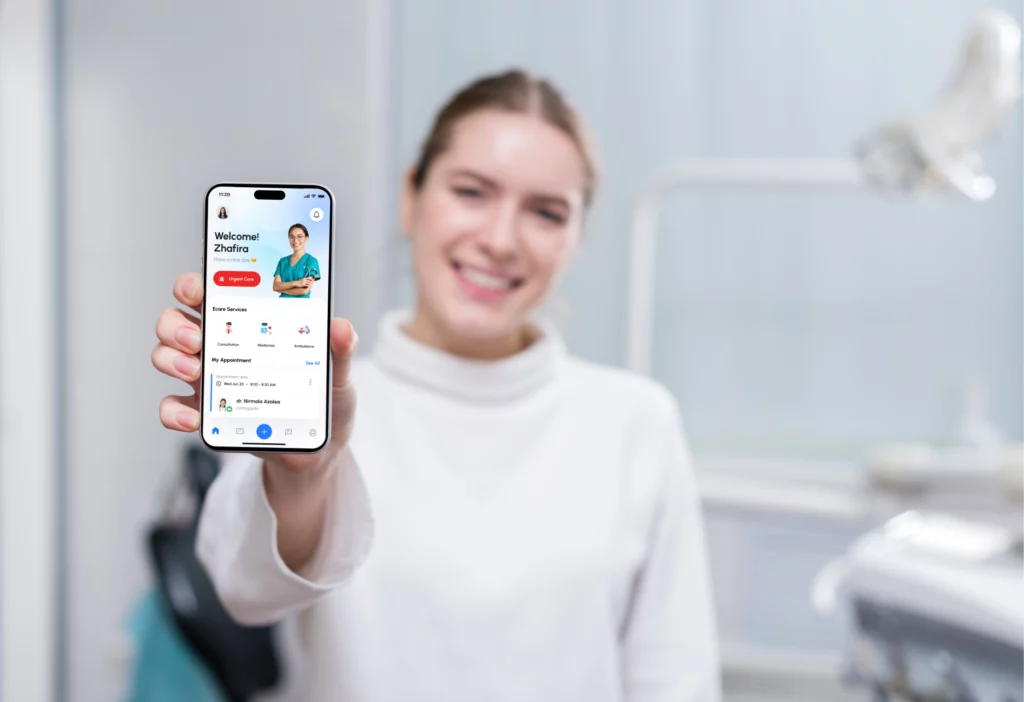Introduction
In the healthcare industry, patient engagement is crucial for providing high-quality care and building long-term patient relationships. Clinics and healthcare providers are constantly looking for innovative ways to enhance patient communication, increase treatment adherence, and improve overall satisfaction. One of the most effective ways to do this is by developing a patient engagement app.
But what exactly should a patient engagement app include? How do you ensure it meets both the clinic’s needs and patient expectations? And how can a mobile app development agency or a custom web application development company help you deliver a scalable and effective solution? Let’s dive into the trends, must-have features, and expert tips to help you create a successful patient engagement app for your clinic.
Why Your Clinic Needs a Patient Engagement App
Healthcare is moving into the digital age, and patient expectations are evolving along with it. Today’s patients want more convenience, better communication, and easier access to their healthcare information. A patient engagement app offers clinics a powerful tool to improve these aspects, enhancing the overall patient experience and driving better health outcomes.
Here’s why investing in a patient engagement app is a smart move for any clinic:
- Improved Communication: With real-time messaging, appointment reminders, and health updates, clinics can maintain better communication with patients, ensuring they stay informed and engaged.
- Increased Patient Retention: A well-designed app fosters stronger relationships with patients, increasing loyalty and reducing the risk of patients switching to other providers.
- Better Treatment Adherence: Push notifications for medication reminders, follow-up appointments, and treatment plans help improve adherence, leading to better health outcomes.
- Streamlined Operations: From appointment scheduling to digital forms, patient engagement apps reduce administrative tasks, freeing up clinic staff to focus on delivering care.
- Data-Driven Care: By collecting patient data through the app, clinics can provide more personalized care, monitor health trends, and make data-driven decisions to improve services.
Key Trends in Patient Engagement App Development
Before we explore the essential features of a patient engagement app, it’s important to understand the current trends shaping this space. These trends not only reflect what patients are looking for but also offer a glimpse into the future of digital healthcare.
1. Telemedicine Integration
Telemedicine became a must-have feature during the pandemic, and its importance isn’t fading anytime soon. More patients are expecting virtual consultations as part of their healthcare options. Including telemedicine in your app allows patients to have remote appointments, access care during off-hours, and reduces the need for unnecessary clinic visits.
Key Features:
- Video consultations
- In-app prescription renewals
- Secure messaging with healthcare providers
2. Health Data Tracking
Patients are increasingly using health wearables and mobile apps to track their wellness. Integrating health data from wearables into your patient engagement app provides valuable insights into patients’ daily activity, heart rate, sleep patterns, and more. Clinics can use this data to offer personalized health advice and early detection of potential health issues.
Key Features:
- Integration with wearables (like Fitbit, Apple Watch, etc.)
- Daily health tracking (exercise, diet, vitals)
- Real-time data sharing with healthcare providers
3. AI-Driven Chatbots
AI-driven chatbots can improve patient engagement by providing 24/7 support, answering common questions, and helping patients schedule appointments or refill prescriptions. These intelligent assistants streamline communication, offer immediate assistance, and reduce the burden on clinic staff.
Key Features:
- Automated appointment scheduling
- Medication reminders
- Instant answers to frequently asked questions (FAQs)
4. Patient Education
Modern patients want to stay informed about their health. Apps that offer educational resources, such as articles, videos, or webinars, about conditions, treatments, and preventive care are highly valued. By providing educational content through the app, clinics can empower patients to take charge of their health.
Key Features:
- Library of health-related articles and videos
- Personalized educational materials based on patient conditions
- Notifications about upcoming webinars or informational events
5. HIPAA Compliance
Security is a top concern in healthcare. Ensuring your app is fully compliant with HIPAA (Health Insurance Portability and Accountability Act) is non-negotiable. Protecting patient data and maintaining confidentiality is critical, and your app must include encrypted messaging, secure storage of medical records, and authentication protocols to meet industry standards.
Key Features:
- Encrypted communication
- Two-factor authentication (2FA)
- Secure storage of patient health records

Must-Have Features for a Patient Engagement App
To ensure the success of your patient engagement app, it’s essential to include features that address both patient and clinic needs. Here’s a breakdown of the must-have features:
1. User-Friendly Interface
Your app should be intuitive and easy to navigate for patients of all ages and technical abilities. A clean, simple layout will reduce frustration and ensure patients can quickly access the information they need.
Features to Focus On:
- Simple navigation menus
- Easy access to key functionalities (appointments, messaging, health records)
- Large, readable fonts and clear icons
- Multilingual support for diverse patient populations
2. Appointment Booking and Reminders
One of the core functionalities of any patient engagement app is the ability to schedule, reschedule, or cancel appointments. Automated reminders through push notifications or SMS can reduce no-shows and improve clinic efficiency.
Features to Focus On:
- Real-time availability of appointment slots
- Automated reminders for upcoming appointments
- In-app scheduling for telemedicine or in-person visits
- Confirmation and follow-up message alerts
3. Secure Messaging and Communication
A direct line of communication between patients and healthcare providers can lead to faster responses and improved satisfaction. Secure messaging allows patients to ask questions, clarify treatment plans, and receive answers from their providers without needing to schedule an in-person visit.
Features to Focus On:
- Secure, HIPAA-compliant messaging
- Push notifications for new messages or urgent updates
- Integration with a clinic’s internal communication system
- Attachments for images, test results, and documents
4. Access to Health Records
Patients expect easy access to their health information, including lab results, prescriptions, and medical history. This transparency can improve patient trust and help them stay on top of their healthcare.
Features to Focus On:
- Secure access to electronic health records (EHR)
- Lab results and diagnostic reports
- Immunization records and medication history
- Health data export for third-party apps
5. Medication Reminders and Management
Many patients struggle with medication adherence, leading to poorer health outcomes. A medication management feature that reminds patients when to take their medication, tracks their progress, and allows them to log missed doses can significantly improve compliance.
Features to Focus On:
- Daily medication reminders with dosage information
- Medication progress tracking and missed dose alerts
- Prescription refill notifications
- Integration with pharmacy apps for easy refills

Pro Tips for Developing a Patient Engagement App
Creating a successful patient engagement app requires more than just ticking off a list of features. Here are some expert tips to ensure your app stands out and delivers value to both your patients and your clinic:
1. Start with an MVP (Minimum Viable Product)
Rather than trying to launch an app with every feature possible, start with an MVP that includes the core features your patients will use the most. This allows you to test the app, gather feedback, and gradually add features based on real patient needs. Check our article about Phases of Software Development.
2. Prioritize Data Security and Compliance
As mentioned earlier, HIPAA compliance is non-negotiable when developing healthcare apps. Work with experienced developers who understand the intricacies of healthcare data privacy laws. Also, consider partnering with a custom web application development company that specializes in healthcare apps.
3. Invest in User Experience (UX)
Patient engagement apps should prioritize UX design. Remember that your target audience may include elderly patients or those with limited technical knowledge, so your app needs to be intuitive. Perform usability testing with actual patients to ensure the app meets their needs.
4. Offer Multi-Platform Support
Ensure your app works seamlessly across multiple platforms—iOS, Android, tablets, and even desktops. By making your app available on various devices, you make it easier for patients to engage with your clinic regardless of their device preferences.
5. Keep Scalability in Mind
As your clinic grows, your app should be able to scale with it. Whether it’s adding more features, handling a larger number of patients, or integrating with new software solutions, ensure that the app’s architecture supports scalability.
Conclusion
Creating a patient engagement app is an investment in both patient satisfaction and operational efficiency. By integrating the right features, following current trends, and partnering with the right development team, your clinic can enhance the patient experience and streamline many administrative tasks. Whether you’re offering telemedicine, providing educational resources, or sending appointment reminders, the right app will empower your patients and support your clinic’s goals.
If you’re ready to create a custom patient engagement app, consider partnering with a mobile app development agency experienced in healthcare solutions. By leveraging the expertise of a software development team, you can build a scalable product that meets your clinic’s current needs and future growth.
